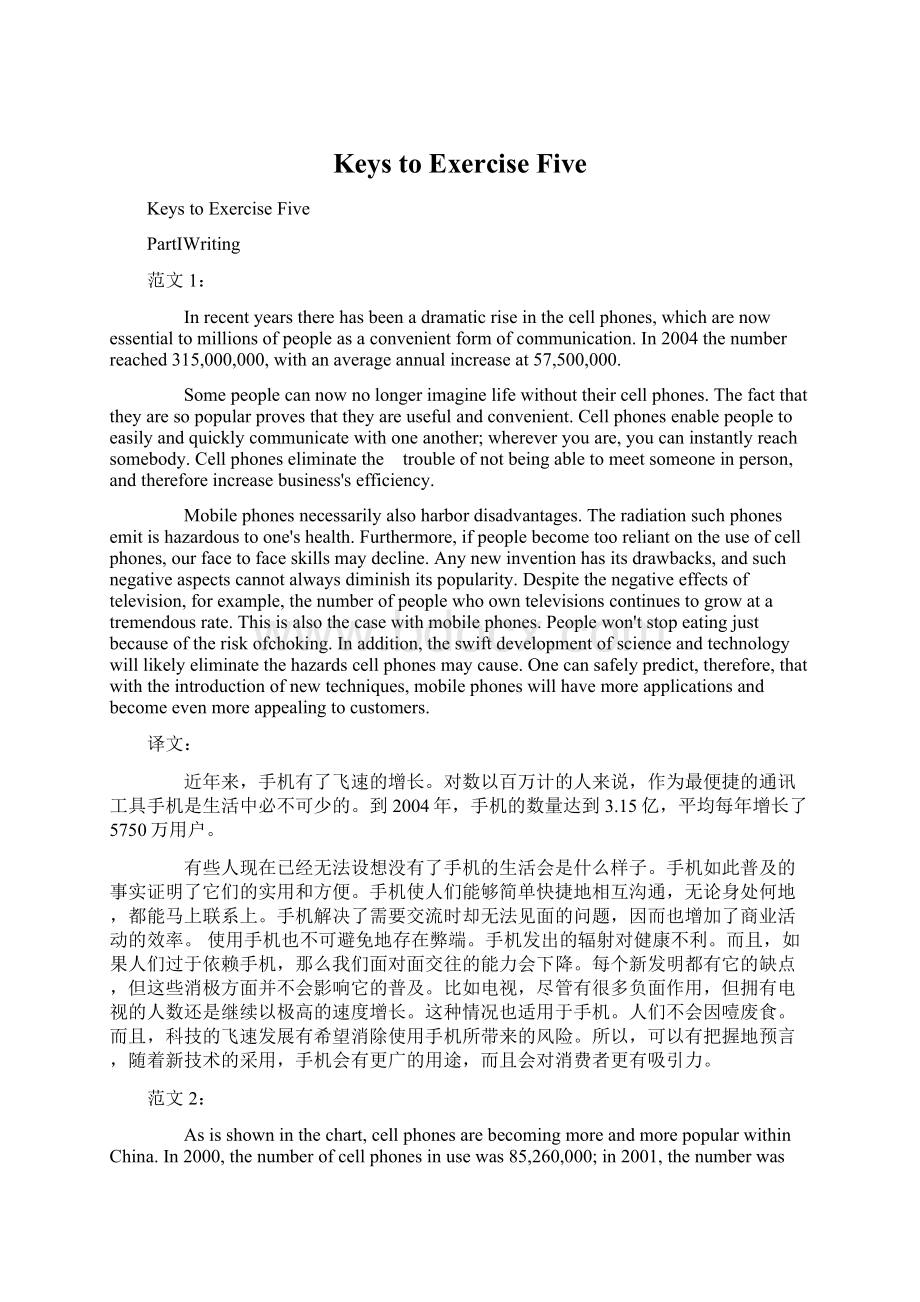Keys to Exercise Five.docx
《Keys to Exercise Five.docx》由会员分享,可在线阅读,更多相关《Keys to Exercise Five.docx(12页珍藏版)》请在冰豆网上搜索。

KeystoExerciseFive
KeystoExerciseFive
PartⅠWriting
范文1:
Inrecentyearstherehasbeenadramaticriseinthecellphones,whicharenowessentialtomillionsofpeopleasaconvenientformofcommunication.In2004thenumberreached315,000,000,withanaverageannualincreaseat57,500,000.
Somepeoplecannownolongerimaginelifewithouttheircellphones.Thefactthattheyaresopopularprovesthattheyareusefulandconvenient.Cellphonesenablepeopletoeasilyandquicklycommunicatewithoneanother;whereveryouare,youcaninstantlyreachsomebody.Cellphoneseliminatethe troubleofnotbeingabletomeetsomeoneinperson,andthereforeincreasebusiness'sefficiency.
Mobilephonesnecessarilyalsoharbordisadvantages.Theradiationsuchphonesemitishazardoustoone'shealth.Furthermore,ifpeoplebecometooreliantontheuseofcellphones,ourfacetofaceskillsmaydecline.Anynewinventionhasitsdrawbacks,andsuchnegativeaspectscannotalwaysdiminishitspopularity.Despitethenegativeeffectsoftelevision,forexample,thenumberofpeoplewhoowntelevisionscontinuestogrowatatremendousrate.Thisisalsothecasewithmobilephones.Peoplewon'tstopeatingjustbecauseoftheriskofchoking.Inaddition,theswiftdevelopmentofscienceandtechnologywilllikelyeliminatethehazardscellphonesmaycause.Onecansafelypredict,therefore,thatwiththeintroductionofnewtechniques,mobilephoneswillhavemoreapplicationsandbecomeevenmoreappealingtocustomers.
译文:
近年来,手机有了飞速的增长。
对数以百万计的人来说,作为最便捷的通讯工具手机是生活中必不可少的。
到2004年,手机的数量达到3.15亿,平均每年增长了5750万用户。
有些人现在已经无法设想没有了手机的生活会是什么样子。
手机如此普及的事实证明了它们的实用和方便。
手机使人们能够简单快捷地相互沟通,无论身处何地,都能马上联系上。
手机解决了需要交流时却无法见面的问题,因而也增加了商业活动的效率。
使用手机也不可避免地存在弊端。
手机发出的辐射对健康不利。
而且,如果人们过于依赖手机,那么我们面对面交往的能力会下降。
每个新发明都有它的缺点,但这些消极方面并不会影响它的普及。
比如电视,尽管有很多负面作用,但拥有电视的人数还是继续以极高的速度增长。
这种情况也适用于手机。
人们不会因噎废食。
而且,科技的飞速发展有希望消除使用手机所带来的风险。
所以,可以有把握地预言,随着新技术的采用,手机会有更广的用途,而且会对消费者更有吸引力。
范文2:
Asisshowninthechart,cellphonesarebecomingmoreandmorepopularwithinChina.In2000,thenumberofcellphonesinusewas85,260,000;in2001,thenumberwas180,000,000;in2002206,600,000;in2003269,000,000.In2004,thenumberis315,000,000.Fromthesestatistics,wecanseetheincreasinguseofcellphones.
Whyhavecellphonesgainedsomuchdominanceinourlives?
Therearemanyfactorscontributingtothisdevelopment.Firstly,acellphonehasnowiresandcanbecarriedeverywhereeasily.Itissmart.Ifyouneedtoringsomeone,youcanjustdialanumberandthephonewillconnectyoutotherightperson.Itcanbeagreathelpforyoutobeconnectedwiththeworld.Secondly,acellphoneissomethingwonderfulthatwecanhavefunwith:
news,games,musicandchatthroughsendingshortmessages.Thirdly,thedropinpriceandthesimultaneousimprovementinthefunctionshavemadeitpossibleforanaveragepersontomakeuseofacellphone.
Thewideuseofcellphoneshasmadethemmoreandmoreindispensableinpeople'sdailylife.Themanyfunctionsofthecellphonehavemadecertainpeoplereluctanttoseparatethemselvesfromtheircellphone.
译文:
这个图表向我们展示了手机在中国变得越来越普遍。
在2000年,全中国的手机使用量为8526万部;2001年为1.8亿;2002年为2.066亿;2003年为2.69亿;2004年的手机使用量迅速增加到3.55亿。
从这些数据中我们可以看到手机使用量在逐渐增长。
为什么手机会成为我们生活中的主导?
有许多因素促成了它的发展。
首先,手机可以无线通话,并且携带方便。
它很灵巧。
如果你想打电话,只须按键,就能与对方通话。
它为你与世界沟通提供了巨大的帮助。
其次,我们可以从手机中获取很多乐趣,比如,看新闻,玩游戏,听音乐,发短信聊天。
最后,手机迅速降价,同时其功能迅速改进,使得普通人都使用。
手机的广泛应用,使它已成为人们日常生活中越来越不可或缺的一部分。
手机的广泛功能使得一些人几乎离不开手机了。
PartⅡReadingComprehension(SkimmingandScanning)
1.N结合标题ToSaveTrees,FightingOneAlienInsectwithOthers迅速扫读全文可知,文章主要不是描写HWA这种虫害本身,而是如何防治这种虫害,故题干表述不正确。
2.Y根据题干中的信息词hallmark和Appalachia'snationalparks定位原文,第三段明确指出Theevergreentrees,ahallmarkofsouthernAppalachia'snationalparks...,可知题干表述正确。
3.Y根据题干中的信息词HWA定位原文,第四段有AlreadythetinybugfromJapan,knownasthehemlockwoollyadelgid(HWA)...,可知题干表述正确。
4.Y题干中有actingquickly,与一小标题同,估计答案在其下段落下。
定位到第二段,发现题干是文中原句,故题干表述正确。
5.N根据题干中的信息词Aninfectedtree定位原文,在ActingQuickly下的倒数第二段段末有Aninfectedtreeusuallydieswithinfiveyearsofinitialattack,可知题干表述错误。
6.NG文章后半部分讲到为了控制HWA,美国已在受灾部分地区投放HWA的天敌Stbettles,但是在文章倒数第二段末尾指出这种方法是否有效还无法判断(tooearlytomeasuretheirimpact),故本题表述正确与否末可知。
7.N在对抗HWA的方法中,文章着重介绍了引入其天敌来达到生态平衡的方法,且在PlansofAttack下的第四段段首有明确说明,故题干表述错误。
8.15U.S.states。
根据题干中的信息词1951定位原文,在ActingQuickly下第一段可找到答案。
9.anothertypeofinfestation。
读完原文,发现RiskyBusiness下讲了用Stbettles来控制HWA这种方法可能带来的风险,而题干正是谈的这种方法,定位RiskyBusiness下的段落,首段即可找到答案。
10.keepHWAincheck。
最后一题多出现在文章末尾,根据题干中的信息词year-round定位RiskyBusines下的段落,在第三段第一句可以找到答案。
PartIIIListeningComprehension
SectionA
11.C
12.D
13.A
14.A
15.A
16.C
17.D
18.B
19.C
20.D
21.B
22.D
23.C
24.B
25.C
SectionB
26.A
27.C
28.A
29.B
30.C
31.A
32.B
33.D
34.B
35.D
SectionC
36.passion
37.investigated
38.value
39.familiar
40.recommend
41.perhaps
42.additional
43.EquivalentGermanmodelstendtobeheavierandslightlylesseasytouse.
44.lessthanothercamerasofasimilartype.
45.Similarly,itissmallerthanmostofitscompetitors,thusfittingeasilyintoapocketorahandbag.
46.Theonlyproblemwastheslightawkwardnessinloadingthefilm.
TapescriptofListeningComprehension
SectionA
Directions:
Inthissection,youwillhear10shortconversations.Attheendofeachconversation,aquestionwillbeaskedaboutwhatwassaid.Boththeconversationandthequestionwillbespokenonlyonce.Aftereachquestiontherewillbeapause.Duringthepause,youmustreadthefourchoicesmarkedA),B),C),andD)anddecidewhichthebestansweris.
11.M:
Whatdoyouthinkoftheprospectsforonlineeducation?
Isitgoingtoreplacethetraditionalschool?
W:
Idoubtit.Schoolsareheretostay,becausetherearemuchmorethanjustbooklearning.Eventhoughmoreandmorekidsaregoingonline.Ibelievefewerofthemwillquitschoolaltogether.
Q:
Whatdoesthewomanthinkoftheconventionalschools?
12.M:
Allenisinthebasementtryingtorepairthewashingmachine.
W:
Shouldn’thebeworkingonhistermpaper?
Q:
WhatdoesthewomanthinkAllenshoulddo?
13.M:
Thefoodinthisrestaurantishorrible.Ifonlywe’dgonetotheschooldininghall.
W:
Butthefoodisn’teverything.Isn’titnicejusttogetawayfromallthenoise?
Q:
Whatcanwelearnfromtheconversation?
14.W:
Caroltoldusonthephonenottoworryabouther.Herleftlegdoesn’thurtasmuchasitdidyesterday.
M:
She’dbetterhaveitexaminedbyadoctoranyway.AndIwillcallheraboutitthisevening.
Q:
WhatdoesthemanthinkCarolshoulddo?
15.W:
DidyouattendAlice’spresentationlastnight?
Itwasthefirsttimeforhertogiveaspeechtoalargeaudience.
M:
Howshecouldbesocalminfrontofsomanypeopleisreallybeyondme!
Q:
Whatdowelearnfromtheconversation?
16.M:
Mr.Brownaskedmetotellyouthathe'ssorryhecan'tcometomeetyouinperson.He'sreallytoobusytomakethetrip.
W:
That'sokay.I'mgladyou'vecomeinhisplace.
Q:
Whatdowelearnfromtheconversation?
17.M:
Washingdishesattherestauranteverydayisreallyboring.
W:
Whydon'tyouquitanddeliverflowersforme?
Q:
Whatdoesthewomanadvisethemantodo?
18.M:
Ihadahardtimegettingthroughthisnovel.
W:
Ishareyourfeeling.Whocanrememberthenamesof35differentcharacters?
Q:
Whatdoesthewomanimply?
Nowyou’llheartwolongconversations
ConversationOne
M:
So,howwasthemeetingwiththeAmericanteachers?
W:
Terrible!
Theywerecompletelyoutofcontrol!
Everyonewastalkingallthetime—askingquestions,makingremarks,sayingtheirownideasinsteadoflettingtheprofessorfinishwhathehadpreparedtosay.Theprofessorgotveryangryandleftinthemiddleofthemeeting.
M:
Oh,dear!
Butyousee,it’swhatI’vebeentryingtotellyou:
Western-styleconversationsaren’thandledthesamewayasJapaneseconversations.American-styleconversationsarelikeagameoftennisorvolleyball.Iserve,andIexpectyoutohitmyballback.Iexpectyoutoaddsomething—toagreeordisagree,ortoaddanexampleoraskaquestionormakeajoke.Thatwaytheballcomesbacktomeagain,andthenIaddsomethingandhititbacktoyou.
W:
Butitisn’trespectfultohitballsattheprofessor!
M:
Iknowit’shardtogetusedto.Japaneseconversationsaremorelikebowling,whereeveryonetakesturns,eachwithadifferentball.Iwatchpolitelywhileyoubowlyouball,thenit’smyturn,andyouwatchwhileIbowlmine.There’snobackandforth.AndtoAmericans,thatseemsveryrude.
W:
Japanesepeoplearenotrudetoforeignguests!
M:
Iagree!
AndtheAmericansdidn’twanttoberudeeither.Look,ifwegobowlingtogether,youdon’texpectmetosnatchyourballhalfwaydownthelaneandthrowitbackatyou?
Inbowling,that’srude.Butifweplaytennistogether,it’srudeforyoutojuststandbackandwatchmyballfall.
W:
Isee.Sobothgamesarefine,andwe’reallgoodplayers,butweareplayingtwodifferentgames.
M:
Right,andit’snotsosimpletoswitchtoanothergame,evenwhenyouunderstandthedifferencesandknowalltherules.Andthere’sanotherquestion:
whenwespeakEnglishinJapan,whichrulesshouldwefollow,whosegameshouldweplay?
Questions19to22arebasedontheconversationyouhavejustheard.
19.Whatwerethetwospeakerstalkingabout?
20.Inwhichcountrydoesthisconversationmostlikelytakeplace?
21.Whichofthefollowingistrueaccordingtotheconversation?
22.WhatdoesthespeakercompareJapanesecommunicationto?
ConversationTwo
M:
What’swrong,mother?
Youlookworried.
W:
Iamworried.Igavetheoldwashwomanourlaundrylast